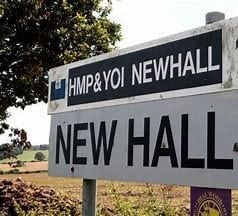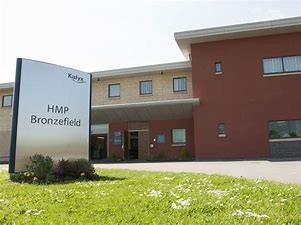The National Centre for Domestic Violence (NCDV), in conjunction with HMP Peterborough, HMP Newhall and HMP Bronzefield, has today announced the roll-out of a nationwide scheme designed to give women prisoners and recent ex-offenders in England legal protection from their abusers.
Originally trialled with HMP Newhall in November 2021, the NCDV has devised the partnership scheme which offers residents at any of the 13 prisons in England housing women* a chance to protect themselves using well-established civil law procedures.

Court Orders such as Non-Molestation Orders can provide a significant degree of practical protection. If a perpetrator breaks the Order he or she can be arrested, charged with a criminal offence and sent to prison for up to five years.
NCDV’s Head of Partnerships and Development, Sharon Bryan, said: “The scheme means vulnerable residents can be offered direct contact numbers to NCDV case workers on their cell phones and access to legal advice from inside prison.
“Our initiative came about thanks to Together Women who run women’s centres across the North of England, including at HMP Newhall and who recognised the high vulnerability of so many women prisoners. It is thought that at least 57% of women in prison will have experienced domestic abuse.”
In 2020 5,011 women were sent to prison in the UK, representing just 4% of overall prisoner numbers. Most received short sentences for non-violent crimes. In 2019, 33% of women remanded into prison by a magistrate’s court and 40% by the Crown Court did not go on to receive a custodial sentence. Of 173 women screened at one English women’s prison, 64% reported a history of brain trauma – and for most this was caused by domestic abuse.
“You might think,” says Bryan, “that one of the few benefits of being sent to prison for some women is physical protection from their abuser. In fact, many women prisoners continue to be at severe risk of coercive control and/or physical danger from those that they cannot avoid on release. Yet, historically the courts will assume that because a woman is in prison she is not at risk. This just isn’t the case.”
Bryan continued: “As a society I think we tend not to look beyond the crime, to root causes. Studies show that women’s offending differs from that of men. Women tend to be less involved in serious violence, criminal damage, and professional crime but do commit relatively more theft.
“For many female offenders crime is related to domestic circumstances, committed to provide for families or to fund offenders’ own or their partner’s addition. And some women are in jail because their abusers coerced them into activities such as theft and prostitution.”
Sara Mollis HMP Newhall Centre Manager said:
“There’s been a huge amount of work between NCDV and Abigail Gillbank to push the partnership forward. She is the only prison IDVA that we know of. There should be more of an NCDV presence in prisons – and women’s prisons should definitely have IDVAs as well.”
Bev Stevens, Women’s Policy Custodial Lead at HMP Peterborough, said:
“The impact of this nationwide scheme in giving female prisoners protection from their abusers is huge. So many of the women in our prisons are victims of abuse and domestic violence, and this work will protect those women on release from prison, prevent future victims, and help break the cycle of re-offending. The scheme benefits women, their children and families, local communities, and the wider society.”

Natasha Munslow, IOMU Team Leader at HMP Bronzefield, said:
“I have worked with females in the establishment for over six years, and this is a brilliant opportunity for our women to feel protected on their release from their abusive partners. I have lost count of the number of times I have been asked how the female prisoners could get a Non-Molestation order out, and I had to advise this could not be done until they were in the community, meaning they were at high risk from their abusers. I am thrilled that I can advise these women to call NCDV for support and help. I am looking forward to jointly working with NCDV.”

Kirsty Richards, Head of Family at law firm, National Legal Service, which has helped vulnerable female (and male) prisoners secure injunctive protection under the Family Law Act 1996, comments:
“Prison staff know just how many female inmates are victims of domestic abuse. Ironically, before they enter prison they may be deemed to be at high risk of abuse – with at least some resources available to them. When they’re sent to jail, that risk is downgraded to low or zero, with the result that they can find themselves discharged with no legal protection at all.
“It cannot be right that women are left to be met at the prison gates by their abusers. A Non Molestation Order can offer them a degree of protection if secured prior to release. The ones we have helped get such an Order have testified to the relief they feel in resuming life beyond the clutches of their abuser.”
*Two English prisons HMP Styal and HMP Eastwood Park, Gloucestershire accept Welsh residents. There are no women’s prisons in Wales.
FURTHER REACTION TO THE NCDV WOMEN PRISONERS INITIATIVE
Kate Griffiths MP for Burton and Uttoxeter said: “All women deserve to have protection from abuse; regardless of whether they have committed crimes or not. I welcome the steps being taken by the NCDV, in conjunction with the prisons, to help protect women with this initiative.
It is important that all those involved in supporting female prisoners make a concerted effort to break the cycle of abuse and reduce instances of ongoing coercive control and domestic violence.
I look forward to working with NCDV further on their initiative and seeing what more the Government can do as part of its ongoing commitment to tackle violence against women.”
David Challen said: “More than half of women who enter the prison system have been a victim of domestic abuse. Far too often the root causes of their crime are ignored. As a result, when victims are released they are left at high risk of perpetrators who lay in wait seeking to coercively control and abuse them.
“Survivors have long lacked protection from the cycle of domestic abuse that often leads to repeat offending. I welcome the introduction of a new nationwide scheme in partnership with NCDV to give survivors the ability to use Non-Molestation Orders to provide them significant protection.
“As a child victim who witnessed domestic abuse and campaigned for my mother’s abuse to be acknowledged I am acutely aware of the need for more awareness of the experiences of abused women in prisons and protection they deserve.”

